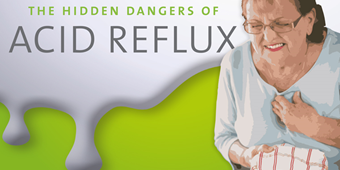3 Things to Know about Breastfeeding, Your Diet and Medications

Find Your Perfect Match
Answer a few questions and we'll provide you with a list of primary care providers that best fit your needs.
Hooray — your baby has finally arrived! If you’re breastfeeding, it’s almost like you’re still eating for two.
When you breastfeed, whatever you eat and drink can pass into your breast milk in small amounts. Keep that in mind as you choose your meals. Some foods might upset your baby’s tummy, or a medication might produce side effects in your little one.
Learn more with these facts about eating and taking medicines while breastfeeding, so both you and your babe stay as healthy as possible:
1. You do not need to follow a special diet while breastfeeding.
Most breastfeeding women can get all the nutrients they need by eating healthy foods. Some moms find they’re just as hungry while breastfeeding as they were when they were pregnant. While you don’t need to follow a special breastfeeding diet, you should make healthy choices like these:
- Eat a variety of vegetables and fruits; seafood, lean meats, poultry, eggs, beans and nuts; and low-fat or fat-free milk, or soy products with added calcium.
- Try to eat seafood two or three days a week while breastfeeding. Fish and shellfish contain nutrients that can help your infant see and learn better. Healthy seafood choices include salmon, catfish, cod, herring, shrimp, canned light tuna, and white (albacore) tuna, but no more than 6 ounces a week.
- Drink whenever you feel thirsty. There is no specific amount of water you need to drink to make enough milk, but breastfeeding mamas do need extra fluids.
- Stock up on these recommended foods: brown rice, 100 percent whole-wheat bread and other whole grains, and fortified cereals with added iron and folic acid.
- Make sure your diet is rich in calcium, vitamin D, protein, iron and folic acid.
- Continue taking your prenatal multivitamins as prescribed by your doctor.
When you breastfeed, whatever you eat and drink can pass into your breast milk in small amounts.
2. There are some foods that you’ll want to limit while breastfeeding.
Think about what you’d like to teach your baby about nutrition when he’s older. You’ll want to make the same healthy choices now that you’ll be instilling in your child later in life. Here’s what you’ll want to cut back on or avoid while breastfeeding:
- Limit foods and drinks that are high in empty calories from added sugars and solid fats. These include desserts, fatty meats, fried foods and sugar-sweetened drinks.
- Don't drink alcohol, and avoid or limit caffeine.
- Don't eat fish high in mercury, which can hurt your baby’s development. Avoid swordfish, tilefish, shark and king mackerel.
- Remember that cigarettes and drugs also affect your breast milk and your baby. Talk with your doctor if you need help quitting.
3. Many medications are safe to take while breastfeeding, but a few can have serious side effects for your baby.

If you need to continue or start a medicine while you’re breastfeeding, you’ll want to make sure what you’re taking is OK for your new little bundle. It’s always best to check with a doctor for the most up-to-date information on medication safety. These guidelines will help you know what to expect if you need meds while nursing:
- While you’re breastfeeding, take medications only when absolutely necessary.
- These medications and supplements all have the potential to have an effect on a breastfed baby:
- Prescription drugs
- Over-the-counter drugs
- Vitamins
- Dietary and herbal supplements
- When taking a medication, watch your baby for signs of reactions. Call your doctor if you notice any of these side effects:
- Loss of appetite
- Diarrhea
- Sleepiness
- Excessive crying
- Vomiting
- Skin rashes
- Medication studies are ongoing and new information comes out often. What you read about a few years back might have changed by now. Always check with your obstetrician or pediatrician before starting a new medication while breastfeeding. A lactation consultant may also be able to help you by providing you with up-to-date information about the safety of a medication you are taking.
Find Your Perfect Match
Answer a few questions and we'll provide you with a list of primary care providers that best fit your needs.
Source: healthychildren.org; womenshealth.gov; breastfeedingonline.com




